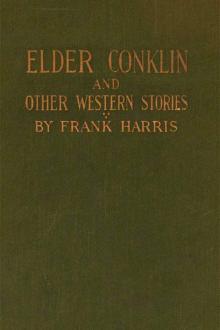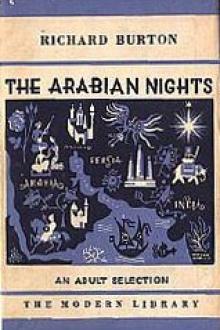Elder Conklin - Frank Harris (i am malala young readers edition .TXT) 📗

- Author: Frank Harris
- Performer: -
Book online «Elder Conklin - Frank Harris (i am malala young readers edition .TXT) 📗». Author Frank Harris
“Sheriff, do you reckon to take any of us uns with you tomorrow?”
With an indefinable ring of sarcasm in his negligent tone, the Sheriff answered:
“I guess not, Mr. Reid.”
Quickly Reid replied: “Then I reckon there’s no use in us stayin’;” and turning to a small knot of men among whom he had been sitting, he added, “Let’s go, boys!”
The men got up and filed out after their leader without greeting the Sheriff in any way. With the departure of this group the shadow lifted. Those who still remained showed in manner a marked relief, and a moment or two later a man named Morris, whom I knew to be a gambler by profession, called out lightly:
“The crowd and you’ll drink with me, Sheriff, I hope? I want another glass, and then we won’t keep you up any longer, for you ought to have a night’s rest with tomorrow’s work before you.”
The Sheriff smiled assent. Every one moved towards the bar, and conversation became general. Morris was the centre of the company, and he directed the talk jokingly to the account in the “Tribune,” making fun, as it seemed to me, though I did not understand all his allusions, of the editor’s timidity and pretentiousness. Morris interested and amused me even more than he amused the others; he talked like a man of some intelligence and reading, and listening to him I grew light-hearted and careless, perhaps more careless than usual, for my spirits had been ice-bound in the earlier gloom of the evening.
“Fortunately our County and State authorities can be fully trusted,” some one said.
“Mark that ‘fortunately,’ Sheriff,” laughed Morris. “The editor was afraid to mention you alone, so he hitched the State on with you to lighten the load.”
“Ay!” chimed in another of the gamblers, “and the ‘aid and succour of each and every citizen,’ eh, Sheriff, as if you’d take the whole town with you. I guess two or three’ll be enough fer Williams.”
This annoyed me. It appeared to me that Williams had addressed a personal challenge to the Sheriff, and I thought that Johnson should so consider it. Without waiting for the Sheriff to answer, whether in protest or acquiescence, I broke in:
“Two or three would be cowardly. One should go, and one only.” At once I felt rather than saw the Sheriff free himself from the group of men; the next moment he stood opposite to me.
“What was that?” he asked sharply, holding me with keen eye and out-thrust chin—repressed passion in voice and look.
The antagonism of his bearing excited and angered me not a little. I replied:
“I think it would be cowardly to take two or three against a single man. I said one should go, and I say so still.”
“Do you?” he sneered. “I guess you’d go alone, wouldn’t you? to bring Williams in?”
“If I were paid for it I should,” was my heedless retort. As I spoke his face grew white with such passion that I instinctively put up my hands to defend myself, thinking he was about to attack me. The involuntary movement may have seemed boyish to him, for thought came into his eyes, and his face relaxed; moving away he said quietly:
“I’ll set up drinks, boys.”
They grouped themselves about him and drank, leaving me isolated. But this, now my blood was up, only added to the exasperation I felt at his contemptuous treatment, and accordingly I walked to the bar, and as the only unoccupied place was by Johnson’s side I went there and said, speaking as coolly as I could:
“Though no one asks me to drink I guess I’ll take some whisky, barkeeper, if you please.” Johnson was standing with his back to me, but when I spoke he looked round, and I saw, or thought I saw, a sort of curiosity in his gaze. I met his eye defiantly. He turned to the others and said, in his ordinary, slow way:
“Wall, good night, boys; I’ve got to go. It’s gittin’ late, an’ I’ve had about as much as I want.”
Whether he alluded to the drink or to my impertinence I was unable to divine. Without adding a word he left the room amid a chorus of “Good night, Sheriff!” With him went Martin and half-a-dozen more.
I thought I had come out of the matter fairly well until I spoke to some of the men standing near. They answered me, it is true, but in monosyllables, and evidently with unwillingness. In silence I finished my whisky, feeling that every one was against me for some inexplicable cause. I resented this and stayed on. In a quarter of an hour the rest of the crowd had departed, with the exception of Morris and a few of the same kidney.
When I noticed that these gamblers, outlaws by public opinion, held away from me, I became indignant. Addressing myself to Morris, I asked:
“Can you tell me, sir, for you seem to be an educated man, what I have said or done to make you all shun me?”
“I guess so,” he answered indifferently. “You took a hand in a game where you weren’t wanted. And you tried to come in without ever having paid the ante, which is not allowed in any game—at least not in any game played about here.”
The allusion seemed plain; I was not only a stranger, but a foreigner; that must be my offence. With a “Good night, sir; good night, barkeeper!” I left the room.
*
The next morning I went as usual to the office. I may have been seated there about an hour—it was almost eight o’clock—when I heard a knock at the door.
“Come in,” I said, swinging round in the American chair, to find myself face to face with Sheriff Johnson.
“Why, Sheriff, come in!” I exclaimed cheerfully, for I was relieved at seeing him, and so realized more clearly than ever that the unpleasantness of the previous evening had left in me a certain uneasiness. I was eager to show that the incident had no importance:
“Won’t you take a seat? and you’ll have a cigar?—these are not bad.”
“No, thank you,” he answered. “No, I guess I won’t sit nor smoke jest now.” After a pause, he added, “I see you’re studyin’; p’r’aps you’re busy to-day; I won’t disturb you.”
“You don’t disturb me, Sheriff,” I rejoined. “As for studying, there’s not much in it. I seem to prefer dreaming.”
“Wall,” he said, letting his eyes range round the walls furnished with Law Reports bound in yellow calf, “I don’t know, I guess there’s a big lot of readin’ to do before a man gets through with all those.”
“Oh,” I laughed, “the more I read the more clearly I see that law is only a sermon on various texts supplied by common sense.”
“Wall,” he went on slowly, coming a pace or two nearer and speaking with increased seriousness, “I reckon you’ve got all Locock’s business to see after: his clients to talk to; letters to answer, and all that; and when he’s on the drunk I guess he don’t do much. I won’t worry you any more.”
“You don’t worry me,” I replied. “I’ve not had a letter to answer in three days, and not a soul comes here to talk about business or anything else. I sit and dream, and wish I had something to do out there in the sunshine. Your work is better than reading words, words—nothing but words,”
“You ain’t busy; hain’t got anything to do here that might keep you? Nothin’?”
“Not a thing. I’m sick of Blackstone and all Commentaries.”
Suddenly I felt his hand on my shoulder (moving half round in the chair, I had for the moment turned sideways to him), and his voice was surprisingly hard and quick:
“Then I swear you in as a Deputy-Sheriff of the United States, and of this State of Kansas; and I charge you to bring in and deliver at the Sheriff’s house, in this county of Elwood, Tom Williams, alive or dead, and—there’s your fee, five dollars and twenty-five cents!” and he laid the money on the table.
Before the singular speech was half ended I had swung round facing him, with a fairly accurate understanding of what he meant. But the moment for decision had come with such sharp abruptness, that I still did not realize my position, though I replied defiantly as if accepting the charge:
“I’ve not got a weapon.”
“The boys allowed you mightn’t hev, and so I brought some along. You ken suit your hand.” While speaking he produced two or three revolvers of different sizes, and laid them before me.
Dazed by the rapid progress of the plot, indignant, too, at the trick played upon me, I took up the nearest revolver and looked at it almost without seeing it. The Sheriff seemed to take my gaze for that of an expert’s curiosity.
“It shoots true,” he said meditatively, “plumb true; but it’s too small to drop a man. I guess it wouldn’t stop any one with grit in him.”
My anger would not allow me to consider his advice; I thrust the weapon in my pocket:
“I haven’t got a buggy. How am I to get to Osawotamie?”
“Mine’s hitched up outside. You ken hev it.”
Rising to my feet I said: “Then we can go.”
We had nearly reached the door of the office, when the Sheriff stopped, turned his back upon the door, and looking straight into my eyes said:
“Don’t play foolish. You’ve no call to go. Ef you’re busy, ef you’ve got letters to write, anythin’ to do—I’ll tell the boys you sed so, and that’ll be all; that’ll let you out.”
Half-humorously, as it seemed to me, he added: “You’re young and a tenderfoot. You’d better stick to what you’ve begun upon. That’s the way to do somethin’.—I often think it’s the work chooses us, and we’ve just got to get down and do it.”
“I’ve told you I had nothing to do,” I retorted angrily; “that’s the truth. Perhaps” (sarcastically) “this work chooses me.”
The Sheriff moved away from the door.
On reaching the street I stopped for a moment in utter wonder. At that hour in the morning Washington Street was usually deserted, but now it seemed as if half the men in the town had taken up places round the entrance to Locock’s office stairs. Some sat on barrels or boxes tipped up against the shop-front (the next store was kept by a German, who sold fruit and eatables); others stood about in groups or singly; a few were seated on the edge of the sidewalk, with their feet in the dust of the street. Right before me and most conspicuous was the gigantic figure of Martin. He was sitting on a small barrel in front of the Sheriff’s buggy.
“Good morning,” I said in the air, but no one answered me. Mastering my irritation, I went forward to undo the hitching-strap, but Martin, divining my intention, rose and loosened the buckle. As I reached him, he spoke in a low whisper, keeping his back turned to me:
“Shoot off a joke quick. The boys’ll let up on you then. It’ll be all right. Say somethin’, for God’s sake!”
The rough sympathy did me good, relaxed the tightness round my heart; the resentment natural to one entrapped left me, and some of my self-confidence returned:
“I never felt less like joking in my life, Martin, and humour





Comments (0)